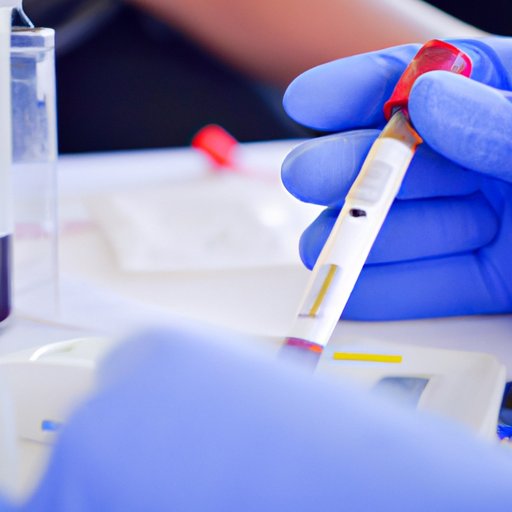
Introduction
Getting a blood test can be nerve-wracking, but did you know that staying hydrated before your test can affect the accuracy of the results? In this article, we’ll explore the science behind why drinking water before a blood test is important, the dos and don’ts of hydrating, and tips for timing your water intake just right. We’ll also discuss the benefits of drinking water before a blood test and the potential risks of overhydration. Read on to learn how to stay well-hydrated before your next blood test.
The Importance of Staying Hydrated Before a Blood Test
Did you know that dehydration can affect the accuracy of blood test results? When you are dehydrated, your blood volume decreases, making it harder for healthcare professionals to find your veins. This can lead to multiple needle sticks and potentially inaccurate results. Additionally, dehydration can cause the blood to become more concentrated, which can alter the levels of certain substances in the blood.
Being well-hydrated before a blood test has multiple benefits. For one, it can make it easier for medical professionals to draw blood, which means you could experience less discomfort during the process. Additionally, it can help ensure accurate blood test results, which could be crucial for your healthcare and treatment.
The Science Behind Hydrating Before a Blood Test
Drinking water can have a positive effect on the body’s circulation and blood flow. When you are well hydrated, there is a good amount of water in your bloodstream, which makes it easier for blood to flow through your blood vessels. This can help make it easier for healthcare professionals to draw blood. In contrast, when you are dehydrated, your blood vessels can constrict, making it harder for them to find your veins.
Dehydration can also affect the composition and volume of your blood. When you are dehydrated, your blood becomes more concentrated because there is less water in it. This can affect the levels of certain substances that are being tested for in a blood test, such as electrolytes or other minerals.
The Dos and Don’ts of Drinking Water Before a Blood Test
If you’re wondering how much water to drink before a blood test, here are some best practices:
- Drink plenty of water in the days leading up to your blood test.
- Drink enough water to stay hydrated, but don’t overdo it. Drinking too much water can dilute the concentration of substances in your blood and affect test results.
- Avoid drinking sugary or caffeinated beverages before your blood test. These can affect the levels of certain substances in the blood.
How to Time Your Water Intake Right Before Your Blood Test
Timing your water intake right before a blood test can also be important. Here are some tips:
- Drink plenty of water several hours before your blood test to ensure that you are well-hydrated throughout the day.
- Only take small sips of water right before your blood test, as drinking too much can dilute the concentration of substances in the blood.
The Benefits of Drinking Water Before a Blood Test
While you may already know the importance of staying hydrated before a blood test, there are some benefits that you may not have considered:
- Drinking water before a blood test can make it easier for medical professionals to draw blood, which can mean less discomfort for you.
- Being well-hydrated can also reduce the risk of fainting during a blood test.
- Having accurate blood test results can be crucial for your healthcare and treatment.
Staying Hydrated During Your Blood Test
It’s important to stay hydrated during a blood test, so here are some tips:
- Bring a bottle of water with you to your blood test, but make sure not to drink too much.
- Take small sips of water during breaks if you feel thirsty.

The Risks of Overhydration Before a Blood Test
While drinking enough water before a blood test is important, it’s also important not to drink too much. Overhydration can affect the concentration of substances in your blood and lead to inaccurate test results. Additionally, overhydration can be dangerous and lead to a condition called hyponatremia, which occurs when there is too much water in the blood. This can be especially dangerous for people with certain medical conditions or those on certain medications. If you have any concerns about how much water to drink before a blood test, talk to your healthcare provider.
Conclusion
Drinking water before a blood test can have a positive impact on the accuracy of test results and your overall healthcare. By following these tips, you can stay hydrated before and during your blood test and avoid any potential risks. Remember to drink plenty of water in the days leading up to your test, only take small sips of water right before your test, and avoid drinking sugary or caffeinated beverages. Stay hydrated, stay healthy, and talk to your healthcare provider if you have any concerns.





